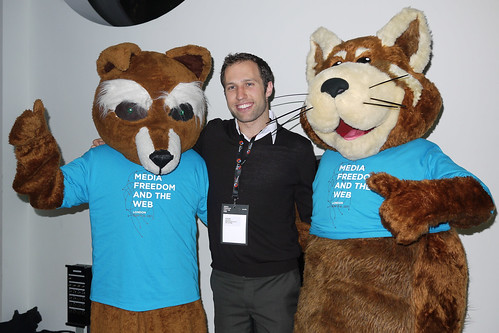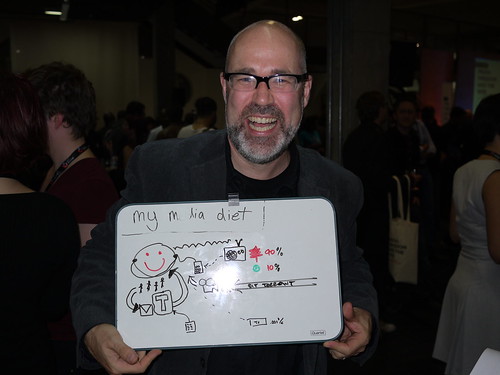The audio fidelity on the #MediaLabTalk livestream wasn't great at first, so I attempted to liveblog. Unfortunately I had to head to class as the second speaker, Jared Ficklin, came on, but we'll be posting video shortly.
Mark Rolston, Chief Creative Officer of frog design, has been with frog for years and has seen the company grow to include strategy.
He believes that companies want to innovate, but that the need to scale and manage complicated supply chains impedes their ability to do so. Some companies are failing to simply build the most innovative product but even more so, to integrate with rest of the product ecosystem to design the entire customer experience.
Frog's experience in the 1980s associating an emotional, ephemeral experience with drinking Coke, which is essentially brown sugar water, has proven useful decades later in designing meaningful software interactions and making virtual experiences richer. (The slide showed a Classic Coca Cola bottle, not New Coke ;-)).
Science fiction has been great at predicting what's to come (by taking plenty of shots, complete with plenty of misses), but it's often been about better aligning ourselves with computers.
A slide shows how the cellphone has replaced So. Many. Functions.
Products like a crown, a scepter, a totem still have deep meaning beyond their physical use, haven't made the jump to digital experience yet.
Our experience with computing has gone something like this:
- First wave: Users are operators, like operators of heavy equipment, without a real connection to the data
- Second wave: Slide shows an iPhone. More personal relationship, we carry it with us; we're babysitters
- Third wave: Slide shows humorously early wearable technology from the Media Lab. The third wave's going to look more like Hal, and consume your entire environment, an invisible layer when you're doing something else like cooking, bathing.
A slide shows the many parts (microphone, screen, processor) that go into a computer, and Mark suggests that computing has become and will continue becoming decoupled. Even the smallest, sleekest computer today will be surpassed by the decoupling of the concept of computing. Computers will not be composed, fixed assemblies of parts, but a set of possibilities between objects that are talking to one another. Computing will always be with you, and won't be something you carry, but rather a diffuse infrastructure.
The entire world is the platform. Mark makes the point that the city is the new computer. It's a contained but still open space of sensors and people and inputs, of network sensors and interfaces.
The challenge, and less obvious part, is now to move from the private computing experience we're used to into a shared experience. Even with digital sharing, consumer electronics have been designed for the individual. A diffuse computing environment inherently includes many people and common experiences.
Frog design took over every screen in Times Square for GE's World Health Day in 2007 with nothing but a PowerMac Pro in a closet and a VGA cable (at the technical level, at least). It was a nice early example of computing at scale, with thousands of people computing simultaneously.
Mark segues into the fact that we've always had a private life and a public life, and there's been relatively little bleed between the two. Sure, we wrote private letters that became public, but they were a relatively low-fidelity medium. But now the two lives are being tangled. Mark quotes Alfred Korzybski, saying, "The map is not the territory." The public image of us has not been an accurate representation of who we really are. But now our maps are becoming their own territory as our private lives go online in high fidelity.
We'll change as much as computing does, Mark says, with an emerging second brain, second life. We have augmented selves. [We can sign up to get knock knock jokes via text and everyone will think we're really funny].
Mark shows a product created years ago, which listens to your conversations and conducts intelligent web queries to augment your knowledge when someone asks you, for example, about the football game last night. They found that this technology itself drove the conversation in a new direction and dominated the original topic–the map overtook the territory. [I'd consider this a failure of the goals of an augmented technology–technology should blend in with our existing social interactions, not completely disrupt them].
Another form of knowledge augmentation is "decision support." Intel sponsored a display to help people pick out outfits at a department store. Again, the question of a shared, embedded computing experience rather than an individual, personal, outfit-selection tool brought up new questions.
One of the most exciting dynamics possible with augmented information is that it grants us new superpowers for social advantage. Ubiquitous computing can help us know more intellectually or socially or give us more basic social warmth. This brings up the question of what it means to know something. There's a difference between someone truly knowing your birthday vs. your Facebook friends "knowing" your birthday. The impending social ramifications can't be overstated.
Mark brings up the example of the film Up in the Air, where everyone in the airline industry, including computer systems, knows George Clooney with a level of false, commercial intimacy, and the movie makes a clear comment on this false life and the opportunity cost of Clooney's character missing out on real connection.
Mark confronted these questions of digitally enabled, real-time knowledge head on at a conference, where the organizers had given everyone a SpotMe tool. It lets you see everyone's name, title, background, and where in the room they are. You can literally go find people as if you have social sonar. The tool basically makes each of us a node in a network, and exposes all of the social information that's normally revealed via conversations and introductions. There are clearly strong benefits and drawbacks to such a tool.
Each of us has a variation of the human brain, and networking them normalizes our differences, to the point that only the loudest obnoxious voices online cause a spike (with implications for our politics).
Handing over agency to a machine requires a level of trust. Mark shows a great video clip of TED attendees taking one of Google's self-driving cars for a spin for the first time. Almost everyone has a freakout moment as the car speeds around and steers itself. It makes us uncomfortable and we question handing over agency to computers/robots.
Frog found this out firsthand when they designed medical devices and pill reminders. Mark says that statistics show that doctors regularly give incorrect advice but are pretty well protected in doing so by the legal system. But a much, much more accurate digital device suffers a much worse fate when it occasionally dispenses the wrong advice. Suing a computer is apparently much easier than suing a doctor. If we allow the Siris of the world to take the next step in intelligence, from dictating existing information to actually making original recommendations, we're going to have to deal with the social and legal ramifications.
Mark thinks one of the terms were going to need to use in a better way is 'magic,' when computing objects escape their mechanical origins and pick up more of the ephemeral. The word 'magic' has historically been owned by charlatans and zealots, but we're going to have to build a new vocabulary of the high mind to take into account our new affordances.
[And, according to event attendee Dan Novy, "The Object-Based Media Group regularly uses the term "Magic" to describe what our goals and design philosophies are."]
Matt Stempeck is a first-year graduate student at the Media Lab / Center for Civic Media.


